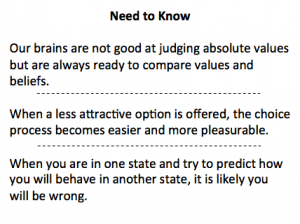How You Can Get a Date
November 29, 2015 ~ Written by: W.B. “Bud” Kirchner
 “How many of you have ever started dating because you were too lazy to commit suicide?” – Judy Tenuta
“How many of you have ever started dating because you were too lazy to commit suicide?” – Judy Tenuta
Why do I think (the majority of) people will be interested in this topic? Let me put forward a fact followed by a couple related assumptions. First, the fact that about 40 percent of marriages end in divorce. Now, my assumptions (1) given the demands of business this percentage will be higher in that context (2) business people who tend to push the envelope would separate still more.
“If you have worked so much you refer to your spouse as “The Plaintiff”.” from “How do you know… if you are an Entrepreneur?” by Kirchner Group
So, my conclusion is getting a date is relevant to more than 50 percent of our readers. Case in point:
You have worked so hard starting/building your business that your spouse left you (likely it was long ago but you just noticed) so now you need to recruit someone else into your life – how do you get a date?
Showing Yourself as a Better Value
“Love looks not with the eyes, but with the mind, And therefore is winged Cupid painted blind.” ~ William Shakespeare
Actually like all my topics – the answer comes from the world of neuroscience/psychology. So – here is your key to getting a date: You arrange to meet your ‘target’ while you are accompanied by a slightly less good-looking version of yourself.
Who gets credit for this advice? One of the foremost behavioral economists, Dan Ariely, who is clearly amongst the most prolific authors on topics related to the Business Brain Model – and its (unexpected) application in other aspects of life.
This particular explanation is in his book “Predictably Irrational, Revised and Expanded Edition: The Hidden Forces That Shape Our Decisions” published by HarperCollins Publishers on June 23, 2009.
For Ariely this is a classic example of asymmetric options involving nearly identical product that clearly have a better value. Our brains aren’t good at judging absolute values but are always ready to compare values and benefits.
“Our brains aren’t good at judging absolute values but are always ready to compare values and benefits”
Also, from a neuroscience point of view when the less attractive option was offered, the choice process became easier and more pleasurable.
Decoys Are Not Just for Hunters Anymore
“I’ve been on so many blind dates, I should get a free dog.” – Wendy Liebman
Lest, you think you are onto something unique to the dating world – here are other applications of the (so called decoy effect) technique per Ariely:
- You can encourage someone to take a trip to Rome over a trip to Paris if both include free breakfast as long as there is also a Rome option without breakfast. Bottom line – it is easier to compare two options for the same choice than two different choices.
- The presence of some small containers would likely boost sales of larger containers if presented together.
- Real estate agents have learned to conduct tours of several houses in the same price range, leaving the most desirable house for the last stop.
Ariely sums all these up by bemoaning the fact we don’t appreciate cognitive limitations the way we understand physical limitations. A divorce or two will change that!
“Love is like a virus. It can happen to anybody at any time.” ~ Maya Angelou
Back to our dating situation – a couple other tidbits (but still on the topic of dating!) based on Ariely’s work which provide peripheral but useful information:
- In the dating ritual men are much more likely to select woman when their photo show dilated pupils. (For more on subconscious reactions check out another article in our collection titled “A Smile is Not Just a Smile” that is part of our Nonverbal Communication series.)
- The so called influence of arousal: when you are in one state, and try to predict how you will behave in another state, you will be wrong. I will leave it to you to extrapolate the implications of this.
And who would have thought dating was this easy!?!? You’re welcome!
About the Author: W.B. “Bud” Kirchner is a serial entrepreneur and philanthropist with more than 50 years of business success. He is not a scientist or an academic but he does have a diversified exposure to neuroscience, psychology and related cognitive sciences. Generally speaking, the ideas he expresses here are business-angled expansions of other people’s ideas, so when possible, he will link to the original reference.
